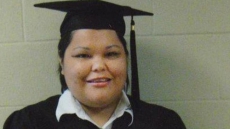VANCOUVER — A globetrotting, two-time murderer caught up in an undercover police sting and whose killings include bludgeoning his roommate to death with a sledgehammer has been labelled a dangerous offender in a B.C. court.
Thomas McDonald, 64, will serve an indeterminate prison sentence after he confessed during a so-called sting operation to carrying out a fatal 1981 shooting in Dawson Creek B.C.
McDonald was convicted three decades after the fact of killing Earl Jones following a bar-room confrontation in which Jones allegedly embarrassed McDonald by slapping him in front of other patrons for asking to dance with his wife.
Court documents indicate McDonald waited for Jones outside the hotel pub before shooting him in the head with a rifle.
McDonald reported that he "really wasn't aiming to kill" Jones but just wanted to scare him, B.C. Supreme Court Justice Gregory Fitch's judgement said.
McDonald is quoted in the judgment as telling undercover officers he was trying to shoot out the truck's windows but that Jones's head got in the way.
He fled to the United States at the time, while Canadian authorities decided in the meantime there was insufficient evidence to recommend charges.
In 2002, McDonald was deported from the U.S. following a string of petty crimes and moved to the United Kingdom. It was there, in 2003, where McDonald used a sledgehamer to kill a roommate he allegedly found rifling through his belongings.

He was convicted and sentenced to six years for the killing, but granted parole in 2007. McDonald promptly breached the terms of his bail, fleeing the U.K. and making his way surreptitiously back into Canada.
Police learned of his return two years later and set up the undercover sting, which led to his 2011 conviction.
During the sting operation, undercover police officers worked to earn McDonald's trust by drawing him into a fake criminal organization, enlisting his help to sell guns and track down an officer pretending to owe money to a loan shark.
"Mr. McDonald was exposed to simulated acts of violence, including the aftermath of a feigned torture session in which the supposed debtor was portrayed to have had a finger severed in retaliation for non-payment of the debt," wrote Fitch in his judgment.
"After this scenario was over, Mr. McDonald not only seemed unfazed by the incident but suggested a number of other ways in which the debtor might be tortured."
Fitch wrote in his judgment that he believes McDonald poses a high risk to act violently in the future and that aging doesn't appear to have lessened his violent tendencies, given that he committed his second homicide at 52.





